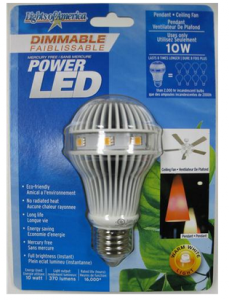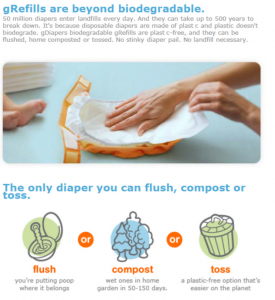Hot on the heels of our latest group presentation on Communication, Forbes has published an article that discusses the FTC’s latest efforts to protect American consumers, by cracking-down on bogus “green” claims.
The article claims that 90% of Americans consider environmental impact when making purchase decisions (I find that number incredibly high – perhaps that’s a bogus claim!). This makes lying about sustainability immensely profitable for shameless companies. The article lists several examples of companies that have recently been busted – and heavily fined – for lying about their “green” products.
Example one: Lights of America, which claimed their LED bulb would last 30,000+ hours. FTC testing found they only lasted a few thousand hours. They were fined $21m as a result.
Example two: gDiapers, which claimed their diaper liners were 100% biodegradable, and could simply be flushed down the toilet after use. The FTC found this was untrue – the diapers did not decompose within one year of hitting the landfill. Even worse, the company claimed that consumers could compost the diapers in their own gardens – but failed to disclose that this was totally not okay once the diapers were soiled with solid human waste. This company intentionally lied to moms! Their fine? $450,000.
The unfortunate thing about both of the above examples is that these companies are preying on customers who are trying to do the right thing for the environment. For some of these customers, it may have been their first attempt at shopping sustainably, and now their trust has been broken. We know that trust is so important in all consumer goods marketing, but even more important in sustainability marketing – where some customers are seriously skeptical about the products. Considering that the green industry already suffers from a lack of credibility, the ramifications of such deceit extend far beyond these companies – to the industry as a whole. This means that yet again, its up to consumers to do their research before buying green. Not so bad if you have time and resources, but for many consumers, this search cost raises the total customer cost to the point where it’s not worth it to buy green.
Well done, jerks.


Well that is quite distasteful but I personally do not find it surprising… It’s funny that you do bring up the light bulb. Did you know that there is in existence a few light bulbs that have been consistently burning (24 hours a day and 7 days a week) for more than 100 years? So then why like you mention do light bulbs only last a few thousand hours? Well right from the beginning of time companies have succumbed to planned obsolescence and have given consumers sub-par products with a set life cycle. They realized by being able to do so they could increase their financial performance. However, I do believe that there has been a significant improvement when it comes to planned obsolescence. The way I look at your dilemma is that just like the relationships you have with other humans you must just simply give your trust to those that seem to warrant it. Then hopefully if they are not complying to their own statements they get caught and you stop trusting them (fool me once shame on you fool me twice shame on me). From my experiences wrong doers always get caught and pay the price for it. So hopefully this remains true and just throw your trust around, it will always end up remaining with those that deserve it the most and as you have demonstrated if in most cases if it sounds to good to be true than it most likely is… Everyday your decisions are based on personal judgment and sometimes you make the wrong decisions and sometimes you get betrayed… The world is not a perfect place but there is a need for tighter regulations and tougher penalties, which would result in less potential law breakers. However, this would result in higher taxes and we all know how the population loves taxes…